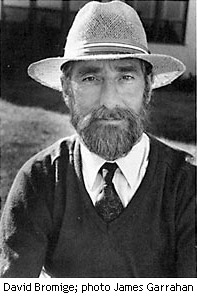"Poetry is the theory of heartbreak" -- David Bromige (October 22, 1933 to June 3, 2009)

Endowed with remarkable wit and a prodigious memory, David Bromige was a paragon of poetic virtues. Not only was he a master of both traditional and innovative forms, but, as a teacher, he exhibited enormous erudition and generosity.
David’s output included dozens of books of his own poems, as well as broadsides and chapbooks, collaborations, fiction, essays, plays. He co-wrote songs with Barry Gifford. And he brought to his public readings a true gift for performance and improvisation. His honors included the Western States Book Award, a Pushcart Prize, two fellowships from the National Endowment for the Arts and two awards from the Poetry Foundation.
I met David Bromige in 1985, when I landed at Sonoma State University for my fourth attempt at a college degree. David taught poetry writing, a course I had every hope to excel at, though I had nothing approaching either work ethic nor talent. But somewhere in my admittedly terrible fledgling poems—written on a manual typewriter so gunked-up one could scarcely distinguish an “e” from a “c”—David found a thread of promise, and he encouraged me to continue writing. In addition to the poets I already liked, he prodded me to read people I’d never heard of: Charles Olson, John Ashbery, Robert Hass, Elizabeth Bishop.
Our classroom was in the theatre department, and it was furnished with ungodly dilapidated sofas, stained with various fluids of both the caffeinated and the human varieties. David hated the florescent lights, so each week he’d wheel in a luggage cart filled with assorted table lamps, which he’d methodically hook—with a network of extension cords— to far-flung wall sockets. In those days, one could poll the students as to whether they preferred a “smoking” or a “non-smoking” classroom. My classmates and I elected for “smoking.”
And so each week we’d sprawl on the sagging couches, reading poems reproduced in purple ink on a ditto machine, and David would sit cross-legged in the center of the room, sigh deeply, smile, and praise even the most sickly poems, though he often seemed to pass first through a period of deep physical pain before he’d bless us with that smile and praise.
Though the school hardly seemed to have the funds, David would always find enough money to bring Sir Stephen Spender, Allen Ginsberg, Cole Swensen. For a semester, we had Robert Grenier in residence; his quirky minimalist poems taped to the wall outside David’s office.
David was without affiliation, though he often got lumped in with the “Language” school of poetry. He didn’t mind: at least they were doing something about what he perceived as the watering down of language’s potency. David’s political acuity translated into a healthy distrust of the conventional ways of writing, and he often built his poems around the misheard or misunderstood. “You helped me in the past,” one of his poems reads, “go on, help me in the past again.”
I think I probably took 18 classes from David Bromige, including my undergraduate classes and my graduate courses. After completing my B. A., I hung around and did an M. A. in English. In 1993, as I was working on my thesis, the state of California—suffering from a budget crisis, as always—extended a “golden handshake” offer to faculty at the top of the salary scale. It was a handsome deal, and David was one of many who were drawn into early retirement. One of the requirements, though, was that the retiree would have to cease work immediately; not even finishing out the semester. This would have left me without my poetry advisor. David graciously offered to oversee the completion of my studies without pay.
Most of the courses I took from David Bromige were directed studies, under the odd heading of “Alternative Major.” I was pursuing an alternative education with this man, though I don’t know "alternative" to what. I hadn’t thrived in the workshop environment; it was far too public; too rife with odd kinds of scrutiny. But in the less-structured courses, where I would write and read under David’s tutelage, I found what Robert Duncan—David’s mentor—had called “that place of first permission.”
The last time we visited, he was as sharp and funny as I remembered, though he seemed to fade in and out of the conversation. He was convinced that there was a town just like the one he lived in just a few miles away, and I couldn’t tell if he was giving me a bit of his classic deadpan put-on or if he was under the influence. His wife, Cecilia, always by his side in those last months, slipped me a note. “Dementia,” it said. Some days good, some days not. This moment, in a fine restaurant with Cecilia, me, and some unremarkable boy who was kind enough to drive me to Sebastopol, David was his most charming and charismatic self. He was the teacher I had loved; my Virgil; my guide.
Filled with paradoxes and quiet inquiries into the cognitive domain of language, David Bromige’s poetry—an extension of his complex and original mind—resonates with me daily. Nervously dodging the shadowy spectre of my own mortality, I remember how vital David Bromige’s presence was. Ever quick to turn a serious moment into something both light and memorable. “Save time,” he once wrote. “Kill it.”
Born in Albany, Georgia, D. A. Powell earned an MA at Sonoma State University and an MFA at the Iowa...
Read Full Biography

